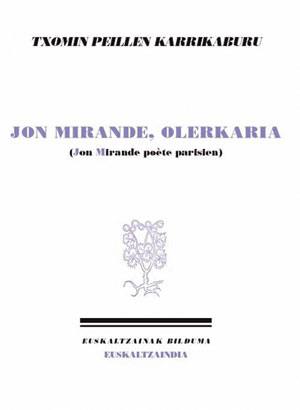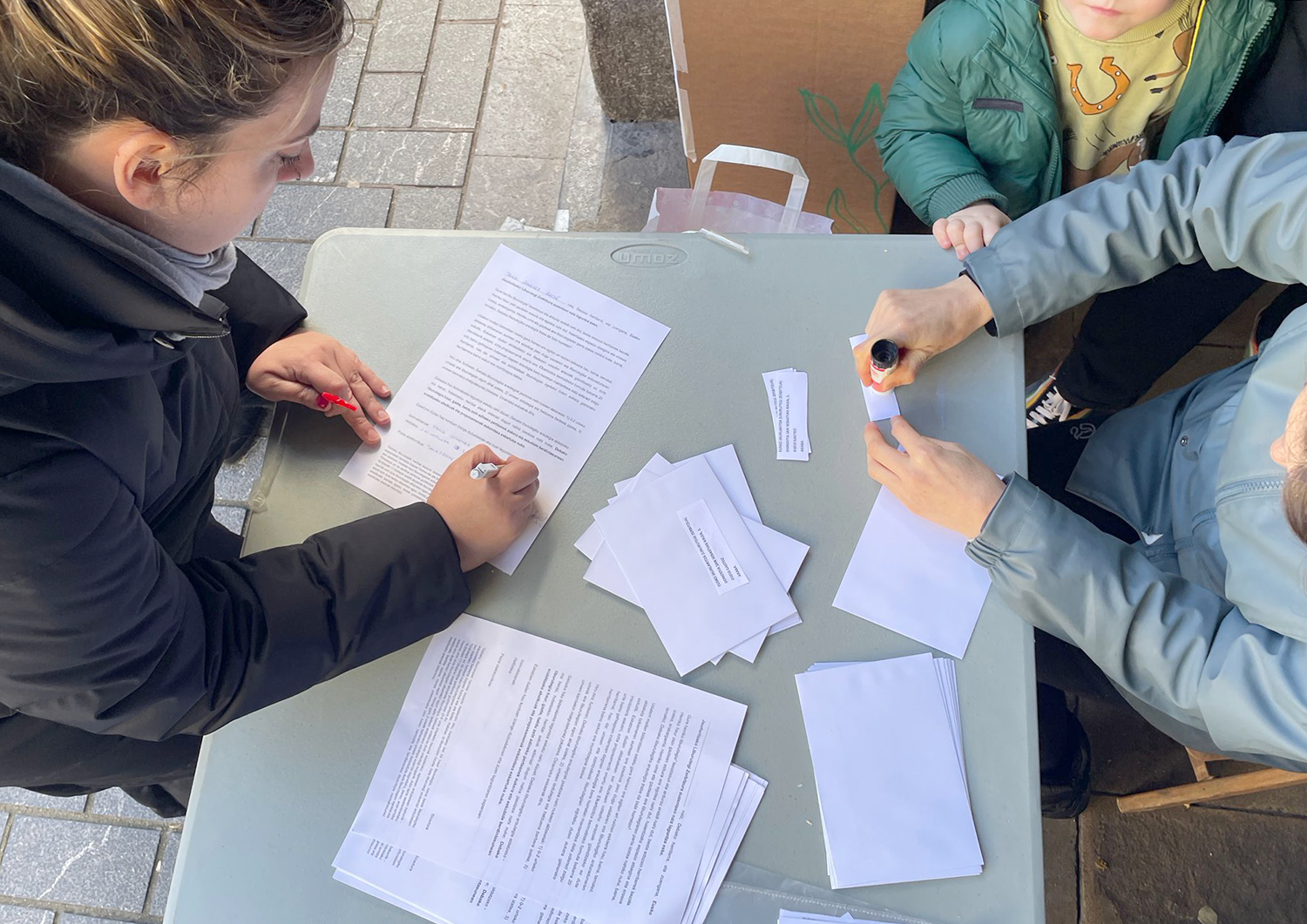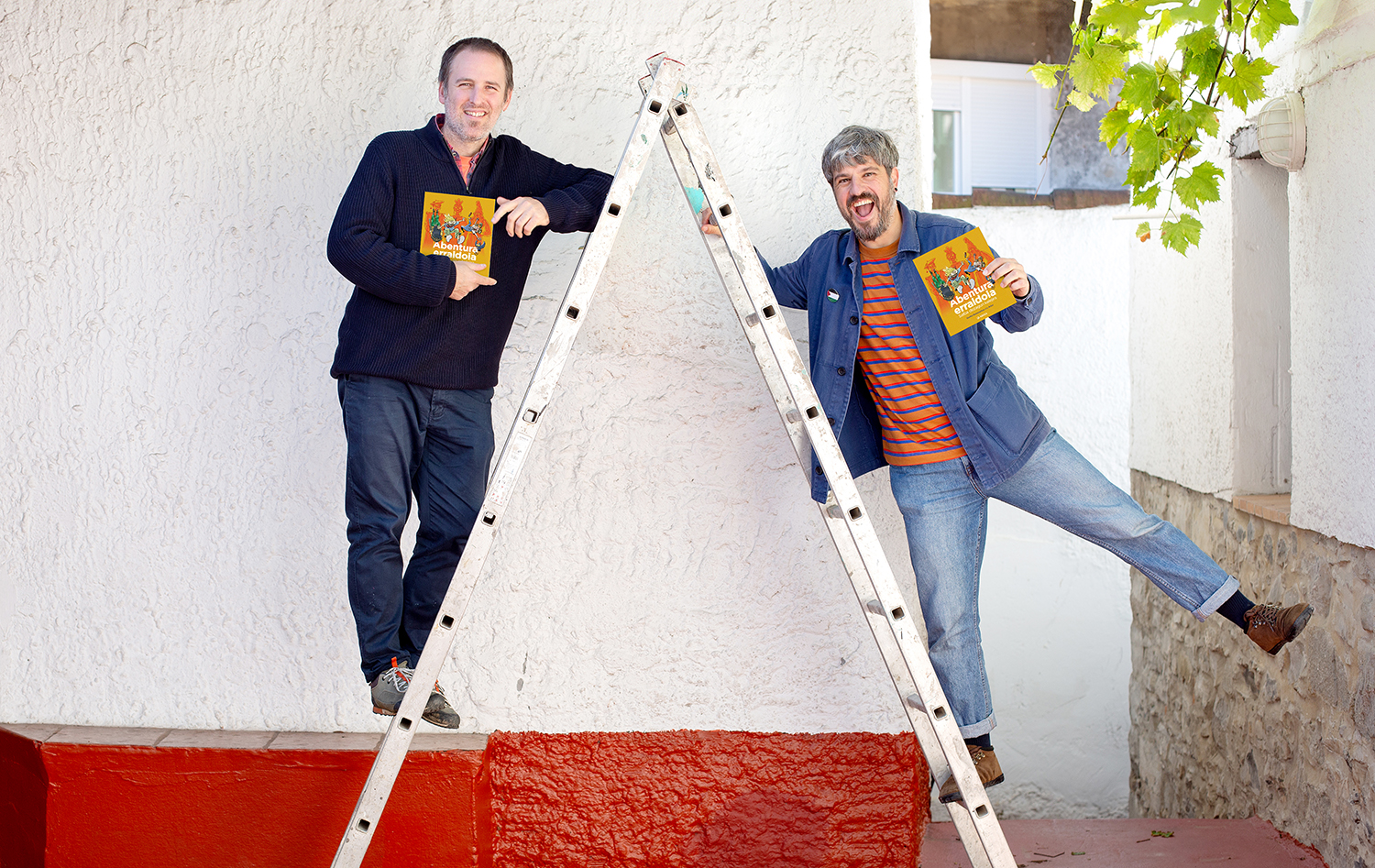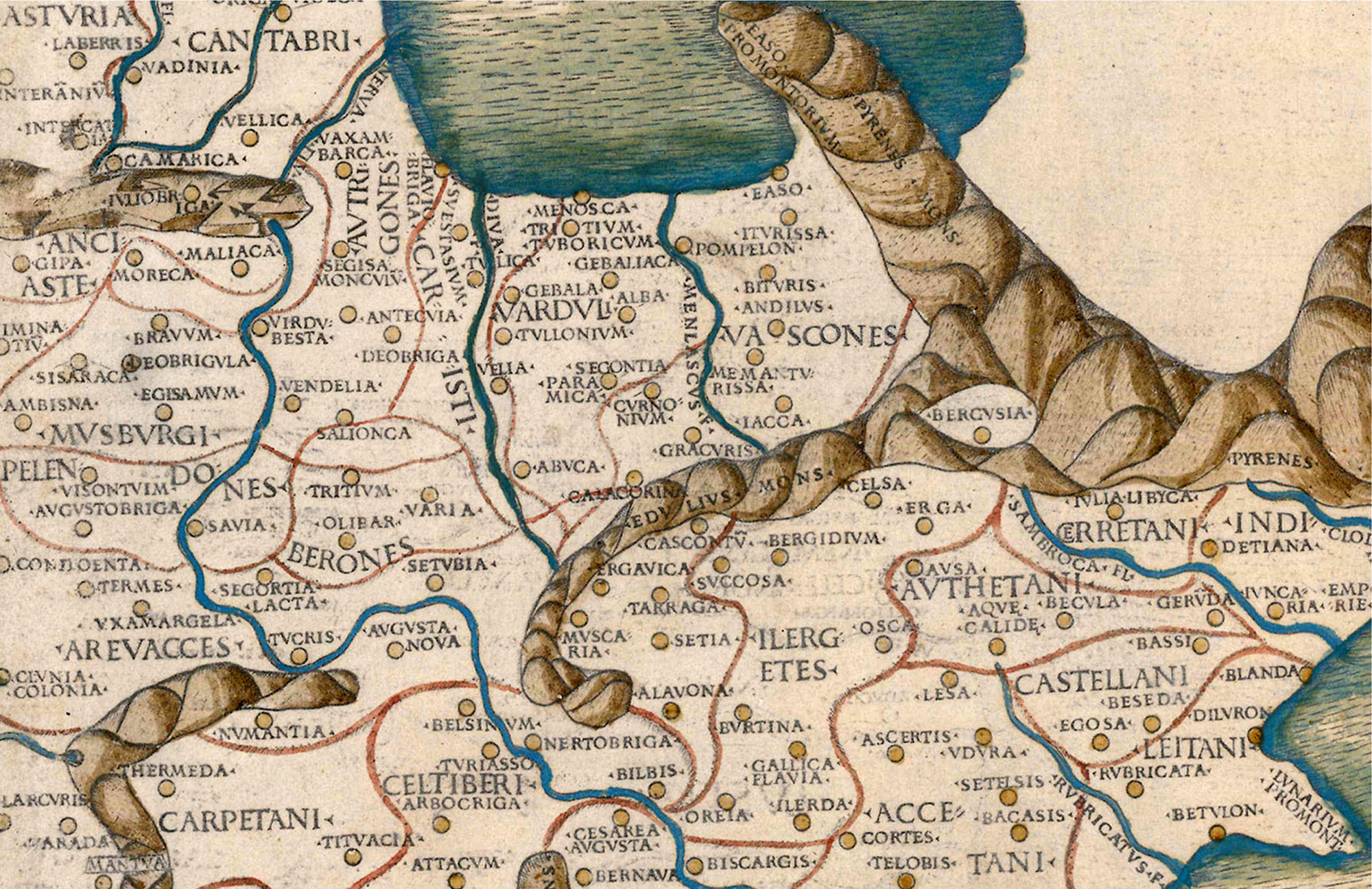Society
Environment
Politics
Economy
Culture
Basque language
Feminism
Education
International
Opinion
wednesday 12 march 2025
Automatically translated from Basque, translation may contain errors. More information here. 

Zarata mediatikoz beteriko garai nahasiotan, merkatu logiketatik urrun eta irakurleengandik gertu dagoen kazetaritza beharrezkoa dela uste baduzu, ARGIA bultzatzera animatu nahi zaitugu. Geroz eta gehiago gara, jarrai dezagun txikitik eragiten.
Depressive maniac, who had the medicine to write, from the string of the Zuberotarras protestants. The GPS of Peillen, his foreword, the life of the author and the analysis of poetic sources are as valuable as Jon Mirande's own poems in this book. The nephews of Christian and Alain Angelié-Mirande, along with Pablo Aristorena, have also written a thorough biography of Mirande and his family. Jon Mirande, poet is a defined collection, in Basque and French, that offers us a complete picture and not exempt from what Oianone was able to write. A lot has been said about this great poet of the 20th century. Here, however, there is no talk in vain: “Being Parisian, the poet wanted to make a French writer in Euskera, but out of some mention, the influence of the symbolists and of Verlain, of Baudelai is not at all clear, and he wrote an article in favor of a Basque tragic romanticism; however, the work of three is unspeakable.” Indefinability
is thus defined. He also speaks through the interview made in February 1953 by Radio-Euzkadi Andima Ibiñagabeitia (published in Issue 23 of the magazine Gernika in that of Poeta). These are the words of the first modern Basque poet, which for the first time raised what is accepted today: “I would differentiate in my poetry the rhythmic and hidden footprint. The school of exile poetry is shown to us in recent times. And I, too, would like to do something about this page in our language. I haven't done enough, of course, for the body of the wolves, from my poems, and I've fixed some poems along the path of consonants. But I love more the poetry that I have built in the inner rite.” After reading them, it is a pleasure to lose yourself in the forty-two poems chosen by
Txomin Peillen, in the mysteries of the lover and at the same time hated, in the forests, on boats and nostalgia as ghosts. The barroquism and decadence of this poet translator has once again made me sweet, new and sad. Because Mirande's order and harmony are counter-replicating, but beautiful. This extreme beauty blurs the very reason, one is lost in pleasure and pain, both inseparable, without wanting to arrive in the morning: “Turn off witches/ dances close/ the skin of the galles/ is a morning.”
is thus defined. He also speaks through the interview made in February 1953 by Radio-Euzkadi Andima Ibiñagabeitia (published in Issue 23 of the magazine Gernika in that of Poeta). These are the words of the first modern Basque poet, which for the first time raised what is accepted today: “I would differentiate in my poetry the rhythmic and hidden footprint. The school of exile poetry is shown to us in recent times. And I, too, would like to do something about this page in our language. I haven't done enough, of course, for the body of the wolves, from my poems, and I've fixed some poems along the path of consonants. But I love more the poetry that I have built in the inner rite.” After reading them, it is a pleasure to lose yourself in the forty-two poems chosen by
Txomin Peillen, in the mysteries of the lover and at the same time hated, in the forests, on boats and nostalgia as ghosts. The barroquism and decadence of this poet translator has once again made me sweet, new and sad. Because Mirande's order and harmony are counter-replicating, but beautiful. This extreme beauty blurs the very reason, one is lost in pleasure and pain, both inseparable, without wanting to arrive in the morning: “Turn off witches/ dances close/ the skin of the galles/ is a morning.”
Most read
Using Matomo
#1
Mikel Garcia Idiakez
#2
#3
Gorka Bereziartua Mitxelena
#4
#5
Unai Lomana Uribezubia
You are interested in the channel: Liburuak
2025-02-11
Mikel Garcia Idiakez
The City Council says Deba's library has "limited space" to prohibit children from being present at most hours
Children under 6 years of age can only stay at Deba’s library for an hour a day. The municipal government has argued that "the available space in the library is limited," but it has not clarified why the time restrictions they impose for this limited space only apply to... [+]
2025-02-04
Mikel Garcia Idiakez
The Government is asked to intervene in the face of the exclusion suffered by children in the library of Deba
Several citizens of Deba have sent a massive letter to the Basque Library Service responsible for the management of public libraries, asking it to intervene in the face of the discriminatory regulations of the local library. Children under 6 years of age can only stay in the... [+]
2025-01-30
Iker Barandiaran
Our past and background in context
Party and recreation. Oral History of Rock Radical Vasco
Javier 'Jerry' Corral
Books, 2025
------------------------------------------------
Javier Corral ‘Jerry’ was a student of the first Journalism Promotion of the UPV, along with many other well-known names who have... [+]
2025-01-21
Mikel Garcia Idiakez
Children are forbidden to be in Deba’s library most of the time
Children under 6 years of age can only stay in the library between 16:30 and 17:30 in Deba, and children under 2 years of age are forbidden directly. They are also subject to other exclusionary measures. Visible discrimination only separates children from literature, and a long... [+]
2025-01-08
ARGIA
The Hontza library of Donostia-San Sebastian will close if no relief is found
The site of the mythical bookstore of Okendo Street from Donostia-San Sebastián has been put for sale and will close the doors if there is no group that takes the relay. The bookmakers have explained to ARGIA that it has not been easy to make the decision, but some owners have... [+]
2024-11-28
Mikel Garcia Idiakez
"Education has to be quiet and indifferent."
In the round table for the presentation of the book Superpowers, the Contertulios have claimed "to leave the exhausting speed of daily life and take time to dream of the school project". They have calmly devoted themselves to transformation, to impotence, to illusion, to the... [+]
2024-11-05
Mikel Garcia Idiakez
Presentation of the book 'Abentura erraldoia' accompanied by a handrail of giants and heads, this Friday in Gros de Donostia
The comparison of giants and heads from the Donostiarra neighborhood of Gros will feature a kalejira and a dance enlivened by the presentation of books organized by ARGIA this Friday: A great adventure. The authors Gorka Bereziartua and Adur Larrea present the kalejira Salba... [+]
2024-10-21
Garazi Zabaleta
Book "Haziak"
“With the book we want to encourage people to start producing seeds”
Miguel Arribas Kelo and Marc Badal, authors of the book Haziak, have been working in the seed world for many years. In addition to practical explanations on seed reproduction, historical, economic, political and cultural elements have been collected, so it can also be... [+]
2024-10-19
ARGIA
Erraldoiak protagonista dituen liburua atera du ARGIAk haurrentzat
MULTIMEDIA - elkarrizketa
2024-10-16
Leire Vargas Nieto
Eztizen Artola Iturrate
"We've been so romantic about the case, we're not aware of the consequences that prison can have."
The day has come: Ihintza's father will be released from prison. This is the time for the opening of the novel Pneumak (Txalaparta, 2024), by Eztizen Artola (Bilbao, 1999). From there, the child will grow up with a backpack on his travels to jail to visit his father, in order to... [+]
2024-10-09
Leire Ibar
Jon Gerediaga, Harkaitz Cano and David de las Heras will be the winners of the Euskadi Literature Awards
At a press conference held on 9 October in Bilbao, the first vice-president of the Basque Government and Councillor for Culture and Linguistic Policy, Ibone Bengoetxea, announced the winners of the Euskadi Prize for Literature.
2024-09-16
Estitxu Eizagirre
The book 'Haziak' will be presented on 20 September at the Azpeitia Food Centre
The first presentation of the book will be on Friday, September 20, at 18:30 pm, at the Food Center of Azpeitia. The programme will involve the authors Miguel Arribas Kelo and Marc Badal, the translator Markel Lizasoain, the designer Maitane Gartziandia and the photographer Dani... [+]
2024-07-17
Urko Apaolaza Avila
Historical cartography of the Basque Country
The trail of maps in the history of a people
It is known that cartography represents much more than the characteristics of a town or territory. Hand maps have conquered continents and empires have been built throughout history, and cultural and political identities have been defined with squads and cartabons. Peoples... [+]
2024-07-04
Ainhoa Aldazabal Gallastegui
Chronic: Day 'Brave Books'
Silent, mute, white... and brave
On 23 February we went to Zaragoza (Aragon) a friend and I. She's a teacher of Early Childhood Education and I'm a literary energizer. Album! The course organized by the association (structure that brings together independent editorials that publish children's and youth literature)... [+]
Eguneraketa berriak daude






















